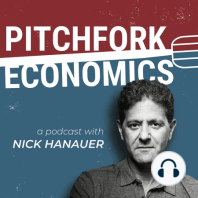14 min listen

Restoring conservative economics (with Oren Cass)
Restoring conservative economics (with Oren Cass)
ratings:
Length:
45 minutes
Released:
Dec 1, 2020
Format:
Podcast episode
Description
“Conservative economics” in the U.S. has become synonymous with libertarian principles. But that’s not what American conservatism was originally about. Oren Cass, the executive director of a new think tank called American Compass, is on a mission to restore conservative economics to its roots in family, community, and industry—and he joins Nick and Goldy to find common ground.
Oren Cass is the executive director of American Compass, whose mission is to restore an economic orthodoxy that emphasizes the importance of faith, community, and industry to the nation’s liberty and prosperity. He is the author of ‘The Once and Future Worker: A Vision for the Renewal of Work in America’.
Twitter: @oren_cass
Show us some love by leaving a rating or a review! RateThisPodcast.com/pitchforkeconomics
Further reading:
Workers of the World: https://americancompass.org/essays/workers-of-the-world/
The elite needs to give up its GDP fetish: https://www.nytimes.com/2020/08/27/opinion/us-gdp-coronavirus.html
Oren Cass on the future of economics and society: https://www.manhattan-institute.org/economics-after-partisanship-markets-society
Website: http://pitchforkeconomics.com/
Twitter: @PitchforkEcon
Instagram: @pitchforkeconomics
Nick’s twitter: @NickHanauer
Oren Cass is the executive director of American Compass, whose mission is to restore an economic orthodoxy that emphasizes the importance of faith, community, and industry to the nation’s liberty and prosperity. He is the author of ‘The Once and Future Worker: A Vision for the Renewal of Work in America’.
Twitter: @oren_cass
Show us some love by leaving a rating or a review! RateThisPodcast.com/pitchforkeconomics
Further reading:
Workers of the World: https://americancompass.org/essays/workers-of-the-world/
The elite needs to give up its GDP fetish: https://www.nytimes.com/2020/08/27/opinion/us-gdp-coronavirus.html
Oren Cass on the future of economics and society: https://www.manhattan-institute.org/economics-after-partisanship-markets-society
Website: http://pitchforkeconomics.com/
Twitter: @PitchforkEcon
Instagram: @pitchforkeconomics
Nick’s twitter: @NickHanauer
Released:
Dec 1, 2020
Format:
Podcast episode
Titles in the series (100)
BONUS: Econ terms and definitions explained by Nick and Goldy by Pitchfork Economics with Nick Hanauer